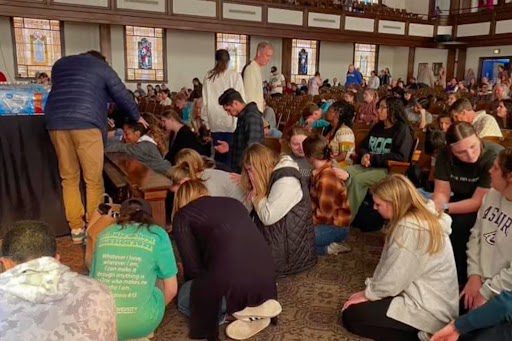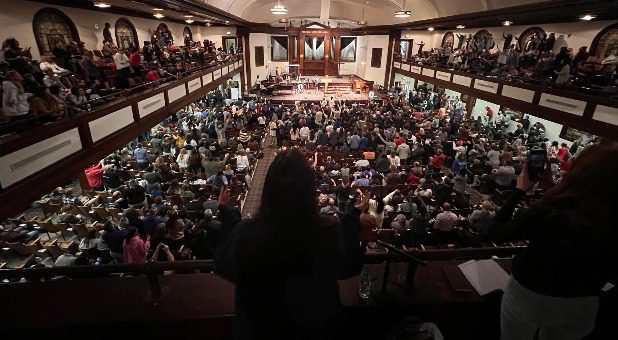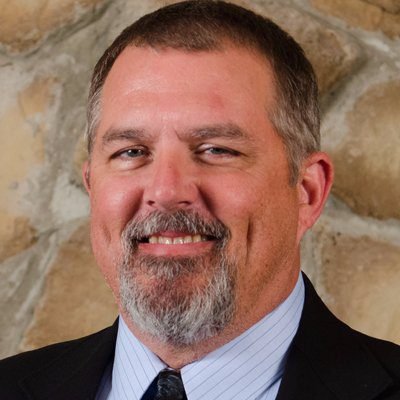
I religiously follow a number of Evangelical blogs and news sites. Of late, there has been a lot of talk on these sites about the Asbury University Revival® and the subject of “revival” in general. Even non-Christian sites have published articles and opinion pieces about Asbury and revival. While it would be tempting to say that all this coverage is a sign that something important is going on, I suspect it is more likely that the coverage is more car-wreck interest than honest reporting on an alleged supernatural move of God among primarily Evangelical college students. With the recent release of Jesus Revolution, a movie that details the alleged grassroots revival among hippies and college students in the 1970s, some are suggesting that the current revival is the grandchild of the 1970s Jesus People revival.
As an atheist, I reject the notion that what is going on at Asbury, other Christian colleges, and even some state schools, is a supernatural work of God. Suggesting this idea is true is is a claim that cannot be verified. It is, at best, a faith claim, and when it comes to matters of faith, no empirical evidence will be forthcoming. I can suggest, however, what is fueling the revival and why some college students are so receptive to its messages and methodologies.
Every generation of young adults faces challenges and struggles as they attempt to find their place in society. I came of age in the 1970s. I remember the struggles I had trying to make my way in life, especially when Polly and I married and we had our first child. I had wants, needs, and desires, and these often conflicted with societal demands and expectations. Every generation goes through these struggles, but the struggles of present young adults seem to be unprecedented in some regards.
The United States is increasingly becoming a secular people, while at the same time Evangelicals, conservative Catholics, Mormons, Trumpists, and one of our major political parties wage what they believe is a “holy” war against secularism, liberalism, abortion, LGBTQ rights, and a host of other red meat issues. The latest culture war has now reached a fever pitch. We now have states and local governments banning books, outlawing clothing, criminalizing abortion, banning instruction on race, interjecting Evangelical Christianity into schools and government institutions, and attacking, condemning, and even banning certain behavior between consenting adults. In Florida and Texas, in particular, we see firsthand what happens Evangelicals gain the power of the state. Governor Ron DeSantis is a proud fascist, a man who has every intention of turning Florida into a Christian theocracy. My God, he is waging war against Mickey Mouse! Donald Trump is a buffoon and an idiot. DeSantis, on the other hand, is one of the most dangerous politicians in America.
Caught in the middle of this culture war that is largely fueled and promoted by their parents and grandparents, are millions of young adults. Generally more liberal and progressive than their parents, many young adults are worried about their future prospects. Throw in worries about climate change, health care, job security, student loan debt, inflation, and increased costs for housing and transportation, and young adults have a lot on their proverbial plates. Their angst over these things has led to increased substance abuse and mental health issues. These things make them more vulnerable to people, institutions, and movements who tell them that they have THE answer to their angst, and that answer is JESUS.
Young adults raised in Evangelical churches are taught that the Bible has all the answers to life’s questions and Jesus is all one needs to have a successful, fulfilled life. He is the cure for whatever ails you. Sunday after Sunday, youth meeting after youth meeting, this thinking is drilled into their heads. Not taught rational inquiry and skepticism, young adults are indoctrinated and conditioned in ways that promote certainty, conformity, and compliance. Everything they know about the bad, evil, sinful world they learned at church.
As long as young adults stay in the Evangelical box, all is well. Everything makes “sense.” Everything is internally consistent. However, there comes a day when young adults must leave the boxed-in walls of safety provided to them for eighteen to twenty years by their parents, pastors, and church families. Many of these young adults were either homeschooled or attended private Christian schools; places where the theological beliefs and practices of their parents and pastors are repeatedly reinforced. Some of these young adults graduate and enroll in classes at a Christian university or college. Again, the goal of these post-secondary institutions is to reinforce what students have already been taught; to keep them in church, and educate the next generation of culture warriors.
What happens, however, is that once young adults arrive at their next stop in the Evangelical indoctrination program, they find that they are free from the control of their parents, pastors, and churches. Young, full-of-life adults, with raging hormones and desires, find themselves in circumstances where they can imbibe in the things of the world; the world that their parents and preachers taught them was evil. And so they enjoy life, that is until preachers at chapel, professors, and parachurch ministry leaders on campus make them feel guilty over their newfound freedom.
These gatekeepers try to get these young adults to return to the safety of the Evangelical box. The goal is to keep young adults from wandering in the world and enjoying the pleasures of the flesh. One way they use is “revival.” Evangelical young adults feel guilty over their “sins.” How could they not? They have spent their entire young lives being beaten over the head with the “sin stick.” They carry in their minds long lists of prohibited behaviors. Yet, try as they might to behave otherwise, they love and enjoy participating in “worldly,” verboten conduct. In their minds they sing Debby Boone’s seminal hit, You Light Up My life: it can’t be wrong when it feels so right.
My wife, Polly, and I attended Midwestern Baptist College in Pontiac, Michigan in the 1970s. Midwestern had strict rules governing student conduct, much like the churches we came from. Yet, we had freedom, albeit a guilty one. The rules forbade personal physical contact with the opposite sex. Most dating students, however, broke this rule. Some even engaged in premarital sex. Why? I know for Polly and me personally, the thrill of intimate physical contact far outweighed the threat of punishment for breaking Midwestern’s puritanical rules. The fear of getting caught and expelled only added to the thrill of the stolen kiss and other physical contact. You know, like the thrill of hotel sex or a moonlight romp on the beach. Yes, there were times when we talked about stopping our necking and rule-breaking. Sermons at church and daily chapel services made us feel guilty about our “sin.” What was normal human behavior had been deemed sinful and evil. When we would become overwhelmed with guilt, we would repent and promise God that we would not touch each other until our wedding day. Of course, the next date and the proximity to each other put an end to the promise we made to God. The road to Baptist Hell is paved with good intentions. When Polly was close by, God was no match for her beauty and charm.
I suspect what is going on among students at Asbury University and other Christian institutions of higher learning is angst about their place in an ever-changing, unsettled world and guilt over not measuring up to the moral standards of their parents, pastors, and church congregations. Into their uneasiness and inner turmoil come preachers armed with Bible verses, well-crafted sermons, and heart-wrenching illustrations, along with emotionally charged praise and worship music. These things tap into the students’ lifelong conditioning and indoctrination, giving birth to what Evangelicals are calling “revival.”
While the spiritual renewal is real and sincere (I, myself, have experienced revival numerous times as an Evangelical Christian and pastor), I suspect students will, in time, learn that revival is like a bath. Good at the time, but it doesn’t last. Once the thrill of revival recedes into the backdrop of life — and it most certainly will, as all revivals do — young adults will still have to figure out how to make their way through this thing we call life. Where they go from here is on them, not God or a temporary dopamine hit. Hopefully, they will take a hard look at how their parents, pastors, churches, and college parachurch leaders indoctrinated and conditioned them in hope of keeping them on the Evangelical straight and narrow. There is a better way.
Bruce Gerencser, 68, lives in rural Northwest Ohio with his wife of 47 years. He and his wife have six grown children and sixteen grandchildren. Bruce pastored Evangelical churches for twenty-five years in Ohio, Texas, and Michigan. Bruce left the ministry in 2005, and in 2008 he left Christianity. Bruce is now a humanist and an atheist.
Your comments are welcome and appreciated. All first-time comments are moderated. Please read the commenting rules before commenting.
You can email Bruce via the Contact Form.









